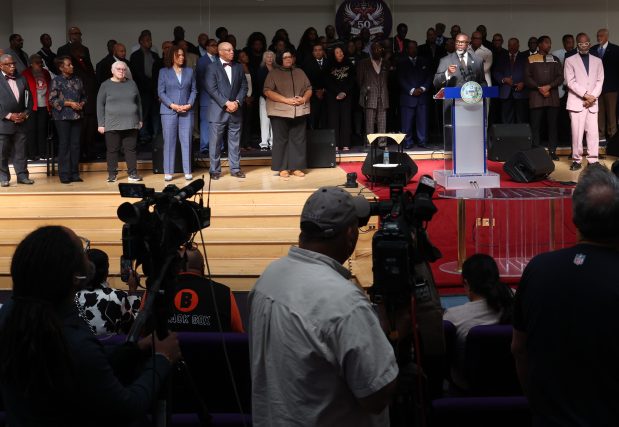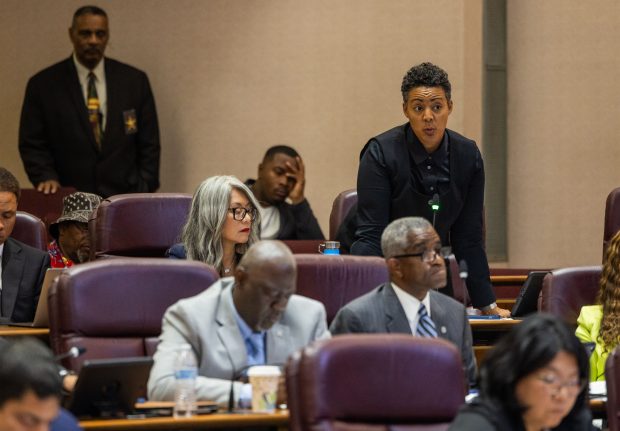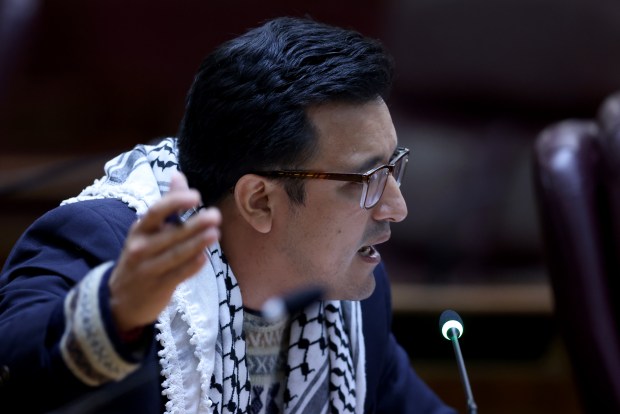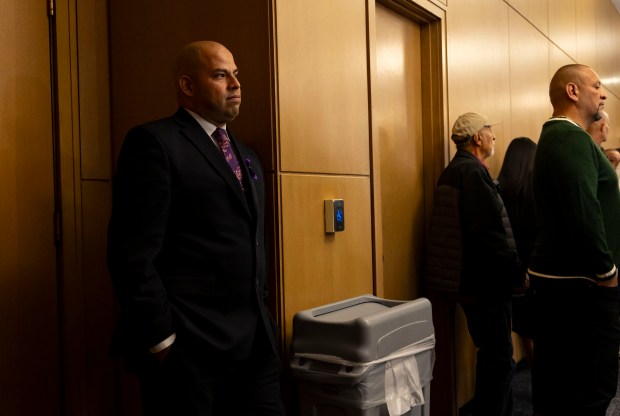When Mayor Brandon Johnson honored the Rev. Jesse Jackson with a key to the city earlier this month, he made a point to remind the audience of his own battle inside City Hall.
“So now, with the power that the people of Chicago gave me — OK, I’mma say that one more time, because apparently there’s some people who are confused about the power that I have,” he said, to chortles from Jackson’s assembled family, friends and fans.
Johnson was nodding to the widening fallout from his administration’s tug-of-war for control of Chicago Public Schools, which landed him a rebuke from a whopping 41 out of 50 aldermen, including a majority of the Progressive Caucus, which has been his staunchest bloc of City Council allies.
However, if the mayor was troubled, he did not betray it during the celebration that in some ways mirrored the scene at a testy news conference he’d held the previous day announcing six new Chicago Board of Education members.
In both, he surrounded himself with friendly Black clergy and politicos. The son of pastors, Johnson is at home in church, and the scenes suggested he may be working to strengthen his African American base in order to make up for weakening political support elsewhere.
And Johnson appeared more and more comfortable playing the role of a mayor who, under fire from once-friends and foes alike, was doubling down on the message that he alone stands at the bully pulpit of the mayor’s office. “There’s a few people that somehow forgot there was a whole election that gave me the power to transform this city,” he said before handing Jackson the ceremonial key.
Those standing in the way of that power, however, may no longer just be moderates and conservatives but also his leftist base that ushered him into office. Recent steps by political allies to break with the Johnson administration could portend his toughest hurdle yet as he presides over an increasingly emboldened council where his path to 26 votes often hinges on progressive support.
Several of these progressives are privately discussing the need to distance themselves from the mayor, saying their hopes that Johnson’s term would be a turning-point moment for the city have been dashed. Instead, they are working on burnishing their independence — and perhaps reelection chances — before they are again on the ballot in 2027.
The Tribune spoke to more than a dozen progressives from the City Council, the Illinois General Assembly and at the grassroots level who, dissatisfied with the direction of the Johnson administration, said their decadeslong movement is at a crossroads.
All said they were disappointed with the mayor’s leadership style along with some of his administration’s agenda priorities and political strategies. Several expressed doubt about whether he is truly a progressive. Of the eight aldermen interviewed, five asked to remain anonymous so they could speak more freely.
“To me, it’s the hypocrisy, right? … The cognitive dissonance between who they said they were and what they were going to do, compared to how they’re moving now that they’re in office,” said Ald. Andre Vasquez, 40th, a vocal mayoral critic from the left. “We’ve gotten someone who is largely identified as progressive in that seat, and because of the job they’re doing, it might make it that much harder to see somebody in there again.”
Johnson and his allies, meanwhile, have sought to place the onus of proving one’s progressive bona fides back on his critics. Asked at this month’s post-council-meeting news conference whether he was taken aback by the brewing discontent within his own political tribe, the mayor said, “Nothing surprises me.”
“If I were behaving in status quo, things would seemingly feel steady, but it would be a steady path down destruction,” Johnson said. “We’re turning this ship around, y’all. I promised I was going to do that, and so as we turn this ship around, it’s going to make people a little bit uncomfortable. Being a bold, progressive leader in this moment is something that this city has been waiting on for 40 years. I’m here now.”
‘Loss after loss’
The latest CPS turmoil was hardly the first moment of doubt some on the left have had in the Johnson administration, but it has been one of the most dramatic.
This month, all seven members of Johnson’s handpicked Chicago Board of Education made the stunning decision to resign. That was after they bucked a campaign by the mayor’s team to get them to oust CPS CEO Pedro Martinez and take out a high-interest loan to cover a pension payment and part of the upcoming Chicago Teachers Union contract.
Critics likened the mass resignations, followed by Johnson’s unveiling of a new slate of appointees the next week, to a power grab. The mayor hit back by suggesting he was being held to a different standard as a Black man, and that the power to appoint the school board members is his and his alone.

That is true, until the transition to a fully elected school board in 2027. But progressive critics contend his team is wielding its power ineffectively.
“I won during a time that I just felt was so important, and I was just imagining in my head that I was going to be a part of this really remarkable thing, a progressive movement,” one freshman alderman said. “Now I’m on the other end, and I’m just like, what have we done? I mean, it’s loss after loss after loss.”
Ald. Maria Hadden, 49th, who co-chairs the Progressive Caucus with Vasquez, said it’s important to distinguish that “the mayor of the city of Chicago is part of the progressive movement. He is not the embodiment of the progressive movement.”
“This is not about him being a progressive,” Hadden said on the administration’s missteps. “A lot of these are challenges that are just for him.”
To be sure, Johnson has notched some early progressive wins in abolishing the subminimum tipped wage and expanding paid time off. This year he also passed a $1.25 billion affordable housing and economic development bond plan, an idea that started under Mayor Lori Lightfoot, and took another victory lap after a successful Democratic National Convention earned Chicago laurels on a national stage.
Setbacks, meanwhile, include the March ballot box defeat of the Bring Chicago Home referendum — a signature campaign promise of Johnson’s to raise the real estate transfer tax on pricier property sales in order to fund homelessness services; his stalled Springfield agenda, which includes a controversial package for a new taxpayer-subsidized Chicago Bears stadium; the ongoing backlash to his CPS board shake-up; and losing the fight against a pro-ShotSpotter item in the City Council as a disparate group of aldermen came together to champion it despite his objections.
Ald. Matt Martin, 47th, led a group of 10 progressives to send a letter this month to the mayor’s budget director, Annette Guzman, expressing “serious concerns” with the administration pushing back the vote on next year’s budget until December, according to a copy obtained by the Tribune. “We struggle to understand why the Johnson administration is demanding several additional weeks,” they wrote, noting his team had similar projections of the nearly $1 billion budget gap last fall.
Martin declined to comment for this story. Guzman’s response to the letter said the delay was necessary “given the complexity of drafting this budget” and refused their request to present the plan before the mayor’s Oct. 30 budget address.

The ShotSpotter gunshot detection technology was targeted by progressive activists, and Johnson campaigned on canceling it. But he instead renewed the contract during his first summer in office, which his administration said was a mistake due to the automatic use of his signature. When the next expiration date rolled around in February, Johnson announced the contract will be extended once more until September — after the DNC — before sunsetting.
Now it’s October, the devices are shut off but there is no answer on what will replace them as a vocal chorus of South and West Side aldermen are leading the charge to urge the mayor to reverse course. Johnson’s office last month issued a request for information for companies to submit their own “technology solution,” the first step in a monthslong procurement process that leaves the door open for Johnson to approve use of a gunshot system much like the one he and other progressives long railed against.
Meanwhile, a veto-proof majority of aldermen lined up behind an ordinance to grant the Chicago police superintendent power to contract with ShotSpotter, a measure the mayor maintains is illegal.
One of the new ShotSpotter flips against the mayor was Ald. Jeanette Taylor, 20th, a firebrand progressive voice in the City Council who’s said she alienated the administration after her remarks last winter that the progressive movement wasn’t ready for the fifth floor.
“Don’t make the same mistakes of the previous administration,” Taylor said in front of reporters this month while expressing frustration with the lack of a ShotSpotter transition plan as well as the CPS situation. “I’m not the end all be all, but I am your ally, and so we should be having conversations. Don’t make me go against you.”
The movement, and the ‘power’
One of Johnson’s most loyal surrogates amid the swirling negativity has been Ald. Byron Sigcho-Lopez, 25th.
Throughout the storm clouds over CPS, Sigcho-Lopez has been on the offensive and hurling back some of the friendly fire coming at the mayor from the Progressive Caucus. He charged “pseudo-progressives” with abandoning their vision of robustly funding public education and challenged them to come up with a better solution to CPS’ finances that don’t include layoffs.
“We hear some of these elected officials and so-called progressives — I don’t understand some of them, how they can call themselves progressives when they are using very corporate language,” Sigcho-Lopez said in an Instagram video posted this month. “For instance, this ‘fiscally responsible,’ that we have to be fiscally responsible. Well, let me start by explaining how fiscally irresponsible it will be to allow (cuts) in our Chicago Public Schools.”

Other left-leaning aldermen who did not sign the 41-person letter ripping Johnson for the schools fight struck a more conciliatory tone.
“Progressive Caucus members from City Council have differing opinions. … I wouldn’t say that that’s going to completely destroy the caucus,” said freshman Ald. Jessie Fuentes, 26th. “For me, it’s extremely important that if we’re going to post criticism, that we also come with solutions.”
Over in Springfield, state Rep. Kambium “Kam” Buckner brushed off the notion that the city was witnessing a pivotal moment for progressives — if such a movement could even be defined.
“When you’re in charge, you’re in charge,” said Buckner, a 2023 mayoral candidate who backed Johnson in the runoff. “The buck stops with you, which is why I think it’s a little bit disingenuous for people to say that the mayor should wear the hat, but the mayor should not have the ability to do what the law allows him to do.”
A political movement struggling to air out and assess internal grievances is not a phenomenon unique to Chicago progressives. But one fissure that has emerged again and again in the leftist coalition Johnson came from is how to respond to the evolving strength of the mayor’s office.
Anthony Moser, board president of the McKinley Park-based Neighbors for Environmental Justice, was one of the first grassroots organizers to speak against the administration’s botched plans last fall to build a Southwest Side migrant base camp on industrial land. Months later, he wondered whether recent residents of the mayor’s office have overestimated their own political muscle.
“I think every mayor after (Richard M.) Daley has thought they were also being elected Mayor Daley, and was shocked to find out that they were just mayor,” Moser said.
Daley held office for over two decades, crushing political opponents while consolidating power and almost never facing meaningful pushback from aldermen. His three successors have had to contend with an increasingly independent, splintering City Council that’s emblematic of a much more polarized Chicago electorate.
If today’s progressive movement wants to demonstrate a separate vision from the mayor’s, it’s not clear what that will look like — or if there even will be a consensus on which path to take. The leftist coalition in Chicago politics, ever a complex tapestry of groups and causes, took four decades to win the mayor’s seat after coalescing around Johnson last year. And that was with the financial muscle of the teachers union, which has for more than a decade positioned itself as the progressive vanguard in the city.
That makes decoupling the progressive brand from Johnson’s administration trickier, as for many casual observers the CTU-organizer-turned-mayor has become the face of the city’s political left. But some progressives now say that mission is vital to the future of the movement.
“Having a progressive mayor being challenged by progressives … it does not mean the movement is fractured,” said Rebecca Williams, a Chicago-based political strategist. “It means the movement remains critical and that the values that we hold and the progressive policy we’re trying to advance is more important than any one leader.”
The Tribune’s Jake Sheridan contributed reporting.





